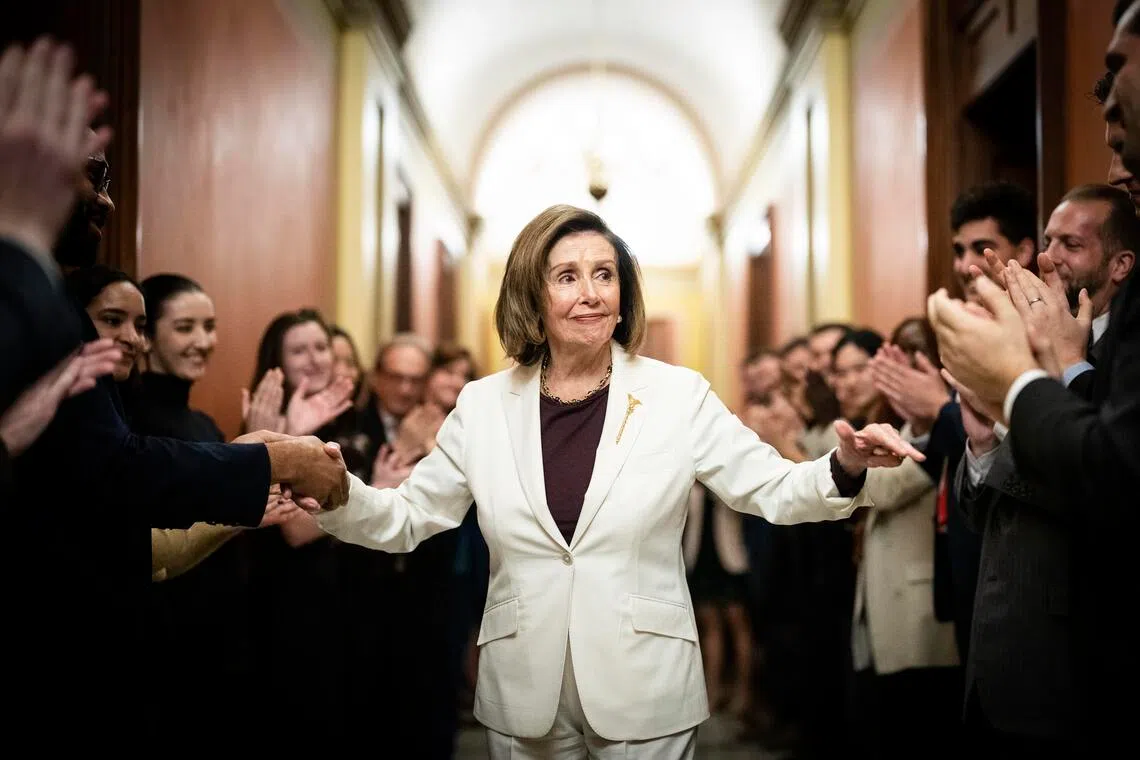Nancy Pelosi, first woman to serve as US Speaker of the House, is retiring - and that is good
Sign up now: Get ST's newsletters delivered to your inbox

Mrs Nancy Pelosi, the first woman to become speaker of the House, has announced that she will not run for re-election.
PHOTO: ERIN SCHAFF/NYTIMES
Michelle Goldberg
Follow topic:
More than almost anyone else in Washington, Mrs Nancy Pelosi earned the right to consider herself indispensable.
As speaker of the House – the first woman to hold that title – she was masterful at holding a fractious and heterogenous Democratic coalition together.
Without her, we probably wouldn’t have the Affordable Care Act. She regularly showed excellent judgment, including on the Iraq War, which she was one of few leading Democrats to vote against.
During President Donald Trump’s first term, she proved skilled at getting under his skin, regularly goading him to lash out like a petulant child.
Mr Trump’s outbursts, one senior Republican complained to Politico in 2019, play “right into her hands”.
Yet Mrs Pelosi was correct to step aside from her leadership role in 2022 to make way for a new generation, even if Mr Hakeem Jeffries, her successor, hasn’t been nearly as impressive as she was.
And she’s right to retire now
The most obvious example of that problem, of course, was former president Joe Biden’s catastrophic decision to run for reelection at the age of 81. But the trouble goes far deeper.
Democrats used to be the party of youthful vigour: think Mr John F. Kennedy, Mr Bill Clinton and Mr Barack Obama.
Even Mr Lyndon Johnson, no one’s idea of a fresh-faced tyro, was a mere 55 years old when he was sworn in in 1963. In recent years, the party got much older, and as it did, it became more stagnant.
There are more than 50 House Democrats who are 70 or older (including Mrs Pelosi, who is 85), compared with just over 30 Republicans.
Since the beginning of 2025, three Democratic members have died in office, padding Republicans’ minuscule majority.
When Mr Trump put Washington under a virtual military occupation, Ms Eleanor Holmes Norton, the city’s sole delegate to the House, was nowhere to be seen.
As The New York Times has reported, Ms Norton, 88, struggles to do her job and sometimes appears not to recognise people she’s known for years. Nevertheless, she’s insisting on running for reelection.
Senate Democrats are led by 74-year-old Chuck Schumer, a staid institutionalist who is either unwilling or unable to speak frankly about America’s spiraling political crises.
Instead, he wanly calls on Mr Trump to respect the norms that the president spends virtually every day spitting on.
Speaking of a government shutdown in September, Mr Schumer said, “I hope Trump will come to his senses,” adding that Republicans should whisper to him, “It’s just not what a president should do.”
Mr Schumer recently recruited Ms Janet Mills, the 77-year-old governor of Maine, to run for Senate. If she succeeds, she’ll be the oldest freshman in the chamber’s history.
Age is not a perfect proxy for being in touch with the zeitgeist; perhaps no politician is more widely beloved by young people than 84-year-old Bernie Sanders.
But as we saw in this week’s New York mayoral election
Among the reasons for Mr Zohran Mamdani’s triumph in New York
According to an NBC News exit poll, he won young men – a demographic Democrats have struggled with – by 34 points.
Many aspects of Mr Mamdani’s campaign may not be replicable outside a liberal metropolis. But one is: Democrats need charismatic young candidates who understand today’s fractured information ecosystem and know how to inspire hope in those who feel deeply disaffected. And to run candidates like that, older ones must make way.
It can be hard for longtime politicians who’ve grown used to the perks of office to give them up.
In a New York magazine story this week about the Democratic gerontocracy, Ms Rebecca Traister quotes political consultant Jen Bluestein: “Many can’t imagine doing anything in which they won’t be heavily staffed and relevant all the time.”
Mrs Pelosi, however, has shown herself more willing than most to put aside her own ego for the greater good.
One of my favorite stories about her comes from Molly Ball’s 2020 biography, Pelosi.
In 2005, Mr Jack Murtha, a conservative Democrat from Pennsylvania and a former Marine, called a news conference to speak out against the Iraq War, which he’d initially supported.
“Our military is suffering. The future of our country is at risk,” Mr Murtha said.
It was a turning point in public opinion about the war. As Mr Murtha became a major face of anti-war opposition, Mrs Pelosi was relentlessly criticised for not being out front with him. Saturday Night Live even performed a skit about her cowardice.
It was all part of Mrs Pelosi’s plan.
“She and Murtha had orchestrated the whole thing,” Ball wrote.
They “agreed that it had to look like a one-man crusade.” It’s part of the secret to her greatness: She’s obsessively attuned to public opinion about politics but surprisingly indifferent to public opinion about herself.
Now, as Mrs Pelosi surely knows, a frightened and furious Democratic Party has turned against its establishment.
In a September Pew poll, 59 per cent of Democratic-leaning voters disapproved of their party’s congressional leadership. There is a fierce longing for new voices. And so Mrs Pelosi is once again meeting the moment.
Her farewell video doesn’t mention age, but it hints at it. Addressing her beloved San Francisco, she said, “There’s a reason why our city has always been synonymous with the future. Here we don’t fear the future. We forge it.”
The same should be true for the Democratic Party. Mrs Pelosi deserves our gratitude for realising it. NYTIMES

